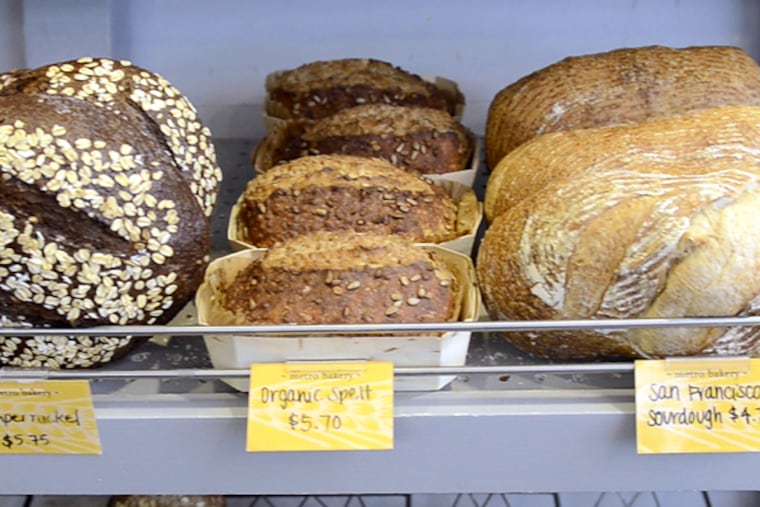Metropolitan Bakery co-owners are taking a fresh slice of life
Metropolitan Bakery opened in the fall of 1993 just off Philadelphia's Rittenhouse Square, taking a chance that a European staple - high-quality, hand-crafted, naturally leavened bread - would become a must-have in a city where residents cared far more about what went on their thinly sliced, sauteed beef than what held it.

Metropolitan Bakery opened in the fall of 1993 just off Philadelphia's Rittenhouse Square, taking a chance that a European staple - high-quality, hand-crafted, naturally leavened bread - would become a must-have in a city where residents cared far more about what went on their thinly sliced, sauteed beef than what held it.
"The question that Wendy and I faced was, 'Were they ready for this?' " recalled James Barrett, who cofounded Metropolitan with Wendy Smith Born.
Twenty years and more than two million loaves later, that's no longer a wonder. In retrospect, what Barrett and Born should have been asking is whether they were ready.
Their journey hasn't been a cakewalk. Low-carb diet fads. Droughts that drove up wheat prices. Blizzards that drove down sales. Retail sites that didn't work out. Two recessions. Robberies. Competitors. Lack of family time. Employee turnover.
"It's a long, hard road," Barrett said. "It doesn't get any easier."
Not that they would do anything else. But for the next 20 years - or however long Barrett, 51, and Born, 61, decide to keep Metropolitan going - their agenda will be one dictated by them.
"The business needs to fit our interest now," Barrett said. "Before, we were doing anything we could."
The business partners met in the 1980s at another gastronomic trendsetter, White Dog Café near the University of Pennsylvania campus. Born was managing partner of the restaurant specializing in locally sourced food; Barrett was pastry chef.
After leaving to work with a nonprofit on hunger and homeless issues for 18 months, Born couldn't resist Barrett's proposal to start an artisan bakery.
They used Barrett's raspberry tarts to coax the owner of a property at 19th and Manning Streets to lease it to them. A half-block south of Rittenhouse Square, it remains Metropolitan's flagship store. Barrett and Born subsequently purchased the site once their bakery business really got cooking.
All production was initially done on Delaware Avenue, across from the since-imploded Jack Frost sugar refinery. In 1996, the company bought an old machine-shop site on Marlborough Street in Fishtown, where all of Metropolitan's cooking and baking is now done.
With more than $3 million in annual revenue - 60 percent from retail, 40 percent from wholesale - the business of 75 employees has been profitable since the company's seventh year.
Getting there has followed a recipe of expansion and contraction.
After the Rittenhouse Square store, shops were added in the 1100 block of Pine Street, in Reading Terminal Market, in Chestnut Hill, and, in 1997, in Old City. The Old City site would become Metropolitan's first café.
Rising real-estate and utility costs forced a retrenchment. Born and Barrett closed Pine Street, which had been robbed twice at gunpoint. The café went next, in 2000, with breakfast and lunch traffic not what they had expected.
In 2006, Born and Barrett decided that the Chestnut Hill shop, which opened in 1998, was too far from home base and sold it under a licensing agreement to Jim Lilly, an unemployed Internet developer and fan of Metropolitan's creations with an appetite for a new line of work.
By then, he was a trusted ambassador. Two years earlier, Lilly paid for the right to open a café, offering Metropolitan's baked goods at 40th and Walnut Streets in West Philadelphia.
"I liked the whole notion of it being handmade bread," Lilly said of his initial attraction to Metropolitan. "I was drawn to it and admired it."
So did competitor David Braverman, owner of LeBus.
"I still love their bread," he said last week. Metropolitan's multigrain round loaf is among his favorites.
Though LeBus, started in 1978 from a bus in West Philadelphia, brought artisan breads to Philadelphians before Metropolitan did, its focus since the mid-1980s has been wholesale, with accounts such as Trader Joe's.
Despite opening a LeBus store on 18th Street, just north of Rittenhouse Square, in the late 1990s - causing a temporary sales drop of 10 percent to 15 percent at Metropolitan - Braverman insisted that "it's never been a competition. There's plenty of business."
Born and Barrett agree, noting the recent residential-building boom in the city. Besides making Metropolitan a habit to new arrivals, their aim now is to avoid getting stale - a dirty word in the industry.
So, last February, they opened a café next to the bakery shop in Rittenhouse Square, offering prepared foods six days a week. In December, they put out their second cookbook, a collection of 20 recipes to commemorate their 20 years in business.
Later this month, they will open a Metropolitan Bakery outlet at Market at the Fareway in Chestnut Hill. It replaces Lilly's store at Germantown and Evergreen Avenues, which closed Friday.
"We're really thrilled," said Abby Pete, who owns the Fareway with husband Ron. "When I heard they were going to be leaving Chestnut Hill, I was personally devastated. Their breads are the best."
BY THE NUMBERS
20
years
in business
2M+
loaves of bread baked
17,000
pounds of flour used weekly
1,000
recipes
$3M+
annual revenue
75
employeesEndText
>Inquirer.com
Wendy Smith Born and James Barrett talk about Metropolitan Bakery, which they opened 20 years ago. www.inquirer.com/businessEndText
215-854-2466